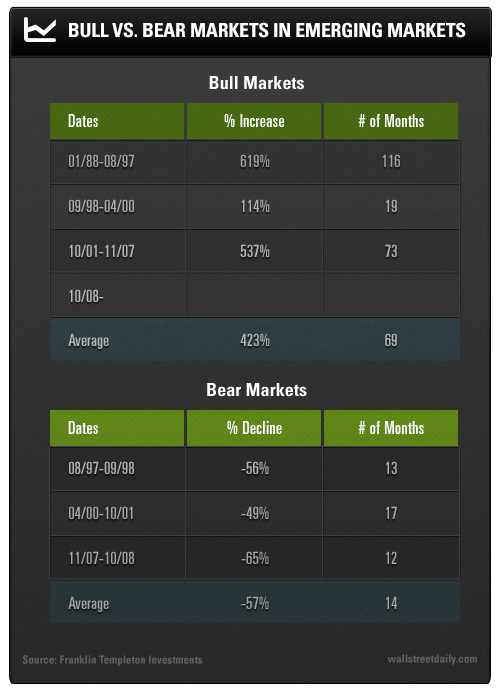It’s a scenario that repeats itself during every stock market downturn: At the first sign of distress, mom and pop investors head for the hills. And the year 2015 is no exception. During July and August, investors withdrew money from both stock and bond mutual funds.
According to Credit Suisse, this is the first time withdrawals have occurred in both categories in consecutive months since 2008. That was, of course, during the last financial crisis.
I believe Yogi Berra said it best: “It’s like déjà vu all over again.”
Here’s What You Need to Do
I’ve been in the investment business since the 1980s and have been through every market selloff since 1987. Even though I’m no longer a professionally licensed advisor, I do have a few thoughts on investor behavior during selloffs.
First of all, if you’re in your 20s, 30s or 40s, don’t worry. The stock market’s long-term track record is undeniable.
For those of you in your 50s or 60s, I would have, at one point in time, warned about bear markets possibly lasting as long as a decade.
But with the Federal Reserve reacting to every market sniffle with lots of money, the dynamics have changed. Look at last week’s turbulence. Already, prominent voices like Bridgewater Associates Founder Ray Dalio have said that further turmoil would encourage more quantitative easing (QE).
Thus, for regular investors, the only real danger point – as I’ve described in a previous article – is shortly before and shortly after your retirement. And if you’re in such a time frame, your stock allocation should’ve already been lowered.
Thus, the one thing investors should do during this current downturn is take a serious look at their portfolios and make sure everything is allocated properly.
Most likely, a rebalancing is in order.
Rebalancing Really Works
Rebalancing a portfolio between stocks, bonds, and cash is important – and it can actually improve your returns.
In 2012, Columbia Business School professor Andrew Ang conducted a study. He looked at returns from January 1926 through December 1940, a period that includes the Great Depression.
Here’s what he found: A portfolio of 100% stocks returned 81% with dividends reinvested. A portfolio of 100% government bonds returned 108%. But a portfolio of 60% stocks and 40% bonds, rebalanced quarterly, returned 146%!
Now, I don’t think rebalancing quarterly is necessary. And you definitely shouldn’t rebalance in the midst of market volatility. Instead, get your game plan in order now, and put it in place after the dust has settled.
That will likely be in a few months. After all, we’re in that nasty seven-year cycle period (1987, 1994, 2001, 2008, 2015) when bad things tend to happen to the stock market.
One final point: If you do rebalance in a taxable account, there will be tax consequences.
How to Reallocate
What do I mean by reallocating or rebalancing your assets?
Well, I use the words of legendary investor Sir John Templeton as a guide. He recommended “to buy when others are despondently selling and to sell when others are greedily buying.”
This translates to a counter-intuitive action: Sell a portion of your winners and add those funds to lagging categories. But only do so if your percentages are seriously out of whack.
Here’s a hypothetical, simplified example:
- A year ago, in the stock portion of your portfolio, you had 20% in technology and biotechnology stocks, and 20% in energy and emerging market stocks.
- But now, with tech and biotech red-hot, these stocks represent 30% of your portfolio. Meanwhile, ice-cold energy and emerging markets stocks are down to 10% of your holdings.
- You should sell where the greed is – where analysts are saying the “trees will grow to the sky” – and buy where investors are fleeing en masse. In other words, bring them back into balance at 20% each.
This strategy will still keep you exposed to the current winning sectors while also boosting your exposure to tomorrow’s winners.
Take a look at this data from Franklin Templeton on emerging markets. It shows that the bull phases are longer and stronger than the bear phases in these markets:

Thus, you want to be positioned to take advantage of such situations. You also don’t want to be highly exposed to a hot sector if it crashes, à la tech stocks in 2000-01.
John Wooden on Investing
To summarize, I’d like to quote legendary basketball coach John Wooden: “If you’re too engrossed and involved and concerned in regard to things over which you have no control, it will adversely affect the things over which you have control.”
That’s a great philosophy for life and it applies to investing, as well.
Don’t worry about the stock market. You can’t control it. On the other hand, you can control how you put your money to work for you.
